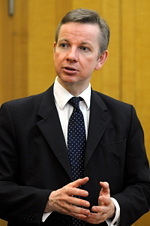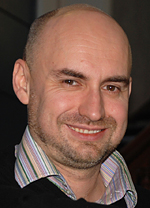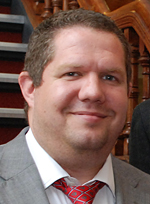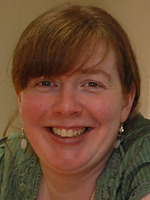Citizenship Education in the curriculum
Wed, 06 Mar 2013 16:35:00 GMT
Politics researchers welcome Citizenship within the new National Curriculum
 Recent confirmation by the Secretary of State for Education, Michael Gove (pictured) that Citizenship education will remain as a statutory programme of study within the new National Curriculum was welcomed by researchers at the University of Huddersfield. Speaking during a House of Commons debate following his statement on reform of the National Curriculum, Mr Gove responded to a question from David Blunkett MP by asserting “Citizenship will remain a programme of study at key stages three and four and I look forward to working with the Right Honourable Gentleman to ensure that this valuable subject is even better taught in more of our schools”.
Recent confirmation by the Secretary of State for Education, Michael Gove (pictured) that Citizenship education will remain as a statutory programme of study within the new National Curriculum was welcomed by researchers at the University of Huddersfield. Speaking during a House of Commons debate following his statement on reform of the National Curriculum, Mr Gove responded to a question from David Blunkett MP by asserting “Citizenship will remain a programme of study at key stages three and four and I look forward to working with the Right Honourable Gentleman to ensure that this valuable subject is even better taught in more of our schools”.
Citizenship education was introduced as a statutory component of the National Curriculum in England in 2002. Its proponents, led by the late Professor Sir Bernard Crick, argued it would encourage active citizenship amongst future generations of young people through greater understanding and engagement with formal processes of democracy whilst also develop positive changes in young people’s attitudes, behaviours and dispositions with regards to their school, home life and communities.
Its introduction was not without controversy though. Researchers at the University of Huddersfield were supportive of the introduction of Citizenship but were at the forefront of academic debate about its content, structure and purpose. For example, Dr Chris Gifford published a paper in 2004 which raised questions about the extent to which Citizenship sought to encourage young people to address social injustice in society and actively challenge inequality. Dr Andy Mycock’s research drew attention to the lack of equality in the provision Citizenship across the UK and the dangers of the previous Labour government using it as a vehicle to promote a contested version of Britishness. But although other research noted that the quality of Citizenship was often variable from school to school, it was clear that the subject quickly bedded into the National Curriculum and was popular both with pupils and teachers.
 Critics of Citizenship raised concerns regarding the potential for political indoctrination. When in opposition, Michael Gove promised to strip down the ‘politically motivated’ curriculum, questioning “why is it that we imagine a particular subject put on the National Curriculum can address these deep and long standing challenges?”. In the wake of the formation of the Coalition government, the position of Citizenship within the curriculum continues but lacked surety and some believed it would lose its statutory status.
Critics of Citizenship raised concerns regarding the potential for political indoctrination. When in opposition, Michael Gove promised to strip down the ‘politically motivated’ curriculum, questioning “why is it that we imagine a particular subject put on the National Curriculum can address these deep and long standing challenges?”. In the wake of the formation of the Coalition government, the position of Citizenship within the curriculum continues but lacked surety and some believed it would lose its statutory status.
The decision to retain Citizenship as a statutory subject is therefore welcomed by staff and students at the University of Huddersfield who have worked hard to develop youth citizenship in West Yorkshire, the UK, and Europe. They have invested considerable time and effort in support of Citizenship and the support of the current government is valued. The ‘citizenship rich’ environment which has been developed on campus reflects concerted efforts to synchronise research, teaching and learning, and extra-curricular opportunities which involve staff and students.
Involved
 Dr Chris Gifford (first) is a member of the Executive committee of the Children’s Identity and Citizenship in Europe (CiCe), which is an Erasmus Academic Network supported by the European Commission’s Lifelong Learning Programme. As part of a European funded Socrates project, Chris worked with colleagues in Portugal, Poland and Hungary to produce guidelines for higher education teachers on intercultural learning for European citizenship. He has led Higher Education Academy projects on citizenship education for undergraduate students and has presented and published his work internationally. Chris has shown in his work how engaging with citizenship debates and issues can transform students understanding of themselves and the world around them.
Dr Chris Gifford (first) is a member of the Executive committee of the Children’s Identity and Citizenship in Europe (CiCe), which is an Erasmus Academic Network supported by the European Commission’s Lifelong Learning Programme. As part of a European funded Socrates project, Chris worked with colleagues in Portugal, Poland and Hungary to produce guidelines for higher education teachers on intercultural learning for European citizenship. He has led Higher Education Academy projects on citizenship education for undergraduate students and has presented and published his work internationally. Chris has shown in his work how engaging with citizenship debates and issues can transform students understanding of themselves and the world around them.
Dr Pete Woodcock (second) is the UK national co-ordinator for CiCe and has participated in its working group which has published guidelines on informal education and human rights, aiming to show how students could learn about human rights based on experience outside of the classroom. He
education and human rights, aiming to show how students could learn about human rights based on experience outside of the classroom. He
teaches and researches in the history of political thought and has written on how to make this subject more accessible.
Dr Andy Mycock (third) served on the Ministry of Justice Youth Citizenship Commission (YCC) during 2008-9, shaping government policies on issues such democratic participation, National Citizen Service and the potential to lower the voting age. Together with YCC chair, Professor Jon Tonge (University of Liverpool), he published widely on youth citizenship issues. In 2012, they published an article in the highly-regarded journal, Political Studies, which drew on a wide range of evidence to prove that the introduction of Citizenship had had a positive impact of the political literacy and democratic participation of young people since 2002.
 Dr Catherine McGlynn (fourth) published research on young people’s attitudes towards history and
Dr Catherine McGlynn (fourth) published research on young people’s attitudes towards history and
citizenship education and their sense of identity. Her work with Chris Gifford on integrating citizenship education into the HE curriculum will shortly be presented in Citizenship Teaching and Learning. This year she is co-organising an international conference at the University of Huddersfield with Andy Mycock on the politics of history and citizenship education in the devolved UK.
Politics staff and students have built mutually-beneficial relationships with organisations, schools and colleges across the region to support the development of youth citizenship. Over the past five years, the University of  Huddersfield has hosted and co-organised a number of events with colleagues from the Kirklees Youth Council linked to International Local Democracy Week. It has also brought young people on campus regularly through the organisation of Politics Focus Day events and seminars involving leading local and national political figures. In November 2012, it hosted a successful ESRC-funded ‘Young People in Society’ event where over 250 young participants took part in youth citizenship-focused workshops.
Huddersfield has hosted and co-organised a number of events with colleagues from the Kirklees Youth Council linked to International Local Democracy Week. It has also brought young people on campus regularly through the organisation of Politics Focus Day events and seminars involving leading local and national political figures. In November 2012, it hosted a successful ESRC-funded ‘Young People in Society’ event where over 250 young participants took part in youth citizenship-focused workshops.
Says Dr Andy Mycock: “The government’s decision to give future generations of young people an opportunity to study Citizenship during their formative educational years can be evidentially supported. Research has proven that Citizenship works. Politics and other social science academics and students at the University will continue to work with partners to promote youth citizenship across the region and more widely.”







